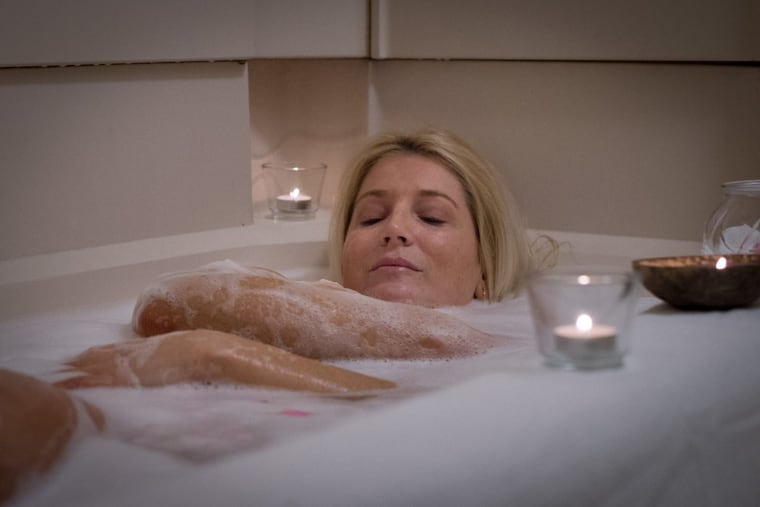Everyone is doing it: Indulgent baths now the antidote to a packed schedule
Baths are big, and sales of bath products, bath services, even bathtub installations prove it.

Four or five times a week, Bethany Asplundh performs an hour-long bath ritual.
She fills her handmade Japanese soaking tub with 100-degree water, bath salts, and oils — eucalyptus to clear her sinuses, lemon to wake her up, lavender to calm her down — and dry-brushes her skin to stimulate lymph flow, improve circulation, and exfoliate. Then, the 52-year-old from Phoenixville relaxes in her dimly lighted bathroom and listens to a book on Audible.
It sounds downright indulgent, foreign even. But more people are turning to baths as an antidote to the very packed, plugged-in schedule that typically makes such luxuries elusive.
Baths are big, and sales of bath products, bath services, even bathtub installations prove it: A March survey by Rescue Spa showed 63 percent of 2,000 respondents took baths. At Lush Cosmetics, bath bomb sales in North America have increased 71 percent, or $50 million, since 2015. In 2017 alone, Lush sold 17 million handmade bath bombs. There are even burgeoning hemp products for baths.
"There's a good focus on self-care right now," said Kim Zimmerman, e-commerce director at Rescue Spa in Rittenhouse Square. Baths are "something people can do to disconnect and take a little me-time."
To satisfy increased demand, the spa added a bath salts category within its bath and body product line two years ago that now includes five products. Though she wouldn't share sales figures, Zimmerman said reorders of those products were especially strong.
Pursoma, a beauty and wellness company in New York that sells bath salts and touts a Pursoma "bath ritual," was launched in 2014 in one boutique, and grew to 50 accounts in its first year. It most recently added Nordstrom as a client, and now has 200 accounts with its best-seller, Digital Detox Bath ($34), "helping to fight wired and tired syndrome, giving people a chance to disconnect," said CEO Shannon Vaughn. Currently in the works is a line for hotels.
"When you travel, you are alone or have the time to have that ritual in your room with no one bugging you," Vaughn said.
For Regan Tilton, 37, of Washington Square, a once-or-twice-a-week bath helps her sleep better, clears her energy, and calms and soothes her. Busy with two jobs — reiki healer in Society Hill and operations manager at Chilly Dog Sweaters in Broomall — she sometimes lights candles or adds crystals or flower petals to the salts, baking soda, and essential oils that help her meditate.
A half-hour soak is also a weekly tradition for Zina Sejdic. With so many bath products on the market, she makes a weekly visit to Lush — the birthplace of the bath bomb — to try whatever's new. "You can have a mini at-home spa day for under $20," she said.
Annabelle Levi, 14, of Queen Village, soaks in bath bombs while catching up on her latest TV shows on her water-resistant phone each evening.
"I like how it fizzes up, smells so good, and makes your skin so soft," she said. "I'm at peace and no one can bother me and I don't have to focus on any of my work."
Cannabidiol Bath Salts (CBD) from Ambika Herbals is a big seller for men and women at Rescue Spa ($50). The company introduced one cannabis-infused product in 2014 and now sells five — including salves, salts, and a tincture. It's the company's most popular line. Though the products contain a low quantity of THC, the main psychoactive ingredient in marijuana, "it's not enough to get you high," said Erica Ragusa, founder of Ambika Herbals, in Breckenridge, Colo.
"It interacts with the brain to induce a calming effect, has pain-relieving properties and works as an anti-inflammatory," Ragusa said.
The hospitality industry, too, has capitalized on the bath trend, often installing soaking tubs to draw guests. Kimpton Hotels says its Fuji soaking tubs — – in 36 of the 230 rooms at the Hotel Palomar and 44 of the 268 rooms at the Hotel Monaco — are roomy enough for two, and some are placed in front of a window to look out over Independence Mall, said spokeswoman Christina Paonessa. Complimentary bath salts are available upon request.
When the Philadelphia Four Seasons opens at its new Comcast Center location in late fall, plans include soaking tubs in some rooms. The Four Seasons in the Seychelles now offers guests several bath rituals, with menus in each villa for a private experience conducted by a dedicated "bath butler," or after-treatment baths in the open air at the spa.
In-home bathtubs also have gone through a metamorphosis: According to Elle H-Millard, a certified kitchen designer and industry relations manager for the National Kitchen and Bath Association in Hackettstown, N.J., out are traditional tubs and whirlpools (which many people found unsanitary); in are soaking tubs — typically freestanding and deeper than a standard tub and often more sculptural in style.
A 2017-18 study showed the popularity of tubs had grown by 26 percent since 2015. Metal tubs are especially popular, as they keep the water temperature consistent and manufacturers offer a variety of stock and custom finishes.
But you don't need a soaking tub — or even any tub — to get the relaxation benefits that advocates tout. Zimmerman found herself yearning for a bath in an Airbnb without a tub, so she made a mustard bath in a large metal bucket, stuck her feet in, and wrapped herself in a blanket.
"I felt very much as relaxed as I do in a bath," she said.